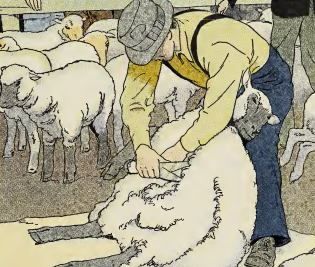SHEEP-SHEARING ON NANTUCKET ISLAND
在南塔克特島剪羊毛
Alice Cushing Gardiner and Nancy Cabot Osborne
愛麗絲·庫欣·加德納和南希·卡伯特·奧斯本
The three greatest needs of everyone are food, shelter, and clothing.
每個人最需要這三樣東西:食物、住所和衣服。
For hundreds of years workers have grown crops for food, built houses to live in, and made cloth from wool and plants.
幾百年來,工人們種植糧食作物,建造住房,用羊毛和植物織布。
Raising sheep for their wool is still an important work, just as it was on Nantucket Island when Mary and Peter were children.
想要收羊毛,養羊是一項重要的工作,就像瑪麗和彼得小時候在南塔克特島那樣。
GETTING READY FOR SHEARING DAY
剪羊毛日
The sheep on Nantucket Island were not kept in pastures,
南塔克特島的羊不在牧場飼養,
but on large open lands where they grazed in thousands.
而在開闊的土地上飼養,成千上萬只羊在那里食草。

There were no shepherds to take care of them, for of course they could not run away;
沒有專門的牧羊人來照顧它們,因為這些羊沒法逃走;
so the sheep roamed about eating what they could find, and became very ragged and dirty.
于是羊就四處游蕩,吃著它們能找到的東西,變得臟兮兮的。
They got along fairly well, for there were neither wild animals nor cruel dogs to harm them.
這些羊生活得很好,因為既沒有野獸也沒有殘暴的狗來傷害它們。
Every year, on the second Monday in June, all the sheep were sheared.
每年六月的第二個星期一,所有羊毛都會被剪掉。
During the week before shearing day the sheep were driven into the great pens beside a large pond, and on Saturday they were washed.
剪羊毛日的前一周,羊群被趕進大池塘邊的大柵欄里,星期六對它們進行清洗。
On the following Monday, everyone on the Island had a holiday and went out to see the shearing and have some fun.
下個星期一,島上的每個人都放假了,去看剪羊毛和玩樂。
They took their lunches with them, or bought them at booths and tents that were set up for the shearing.
他們帶著午餐,或是在棚子里,或是在為剪羊毛而搭的帳棚里買午餐。
Peter's Uncle Samuel owned many sheep.
彼得的叔叔塞繆爾養了許多只羊。
He always provided lunch for his shearers and his family in his own tent.
他總是在自己的帳篷里為剪羊毛工人和家人提供午餐。











